Plumbing trouble has a way of sneaking up on you. One week everything is fine, the next you’ve got a dripping faucet or water pooling where it shouldn’t. For homeowners in Indianapolis and the Greater Indy area, paying attention to small problems before they turn into plumbing emergencies can save a lot of money and stress.
Indy’s weather doesn’t make it any easier. Winters freeze pipes, heavy summer storms push sewer systems to their limit, and older homes around the Circle City often come with plumbing that’s seen better days. Knowing the most common plumbing issues and when to call for help gives you a head start.
Leaky Pipes & Faucets
That drip from the kitchen sink may not seem like much, but over time it wastes gallons of water. Leaks in pipes are even trickier because you might not see them right away. Look for stains on the ceiling, damp spots under sinks, or a musty smell in the basement.
A faucet washer is an easy swap, but if water is running behind the walls, that’s not a DIY job. That’s when you want a local plumber in Indy who can find the source fast and fix it before damage spreads.
Clogged Drains and Toilets
Clogs are about as common as it gets. Kitchen drains fill up with grease and food scraps, bathroom sinks clog with hair and soap, and toilets back up when the wrong things get flushed.
A plunger usually works on small clogs. But if water starts backing up into more than one drain, you may have a sewer line issue. That’s the point where calling a plumber makes sense. A quick service call can keep a messy backup from turning into water damage.
Water Heater Issues
Nothing ruins a morning faster than a cold shower. Water heaters act up for a few reasons: sediment building up in the tank, worn heating elements, or the unit simply getting old.
Watch for these signs:
- No hot water
- Water that runs out too quickly
- Odd banging noises from the tank
Regular maintenance like flushing the tank once a year helps. But if your water heater is more than 10 years old, it’s usually smarter to plan for a replacement before it quits completely.
Low Water Pressure
Low water pressure is frustrating and can have a few different causes. Mineral buildup in pipes is common, especially in older Indy homes. Sometimes it’s a small clog in a faucet aerator, other times it’s a hidden leak.
If your neighbors also have low pressure, it could be a municipal issue. If it’s just your home, check the easy things first. If that doesn’t solve it, a professional can track down the problem.
Frozen and Burst Pipes
Hoosiers know how cold an Indy winter can get, and that cold puts pipes at risk. When water inside freezes, it expands and can split a pipe wide open. A burst pipe can dump hundreds of gallons of water into your home in minutes.
To prevent frozen pipes, insulate the ones in basements, garages, and exterior walls. On really cold nights, let faucets drip and keep cabinet doors open so warm air circulates. If a pipe does burst, shut off your main water supply right away and call for burst pipe repair.
Sewer Line Problems
Sewer problems are messy and often hidden until the signs show up. You might notice foul odors outside, drains that gurgle, or multiple clogs happening at once.
Tree roots are a big cause in the Circle City. Aging pipes and shifting soil don’t help either. A sewer inspection from a professional plumber can show if you need a repair or a full replacement.
How a Professional Plumbing Company Can Help You
Some problems are small fixes. Others point to bigger issues you don’t want to ignore. That’s where Chapman comes in. We’re proud to serve the Greater Indy area with same-day plumbing services, honest pricing, and reliable solutions.
From bathroom plumbing repairs to water heaters and emergency calls, our licensed team knows how to keep Indy homes running smoothly. Hoosiers count on us because we’re fast, professional, and affordable.
Should there be water in my water softener salt tank?
While a small amount of water in the salt tank is normal during certain cycles, if your water softener is full of water, it could compromise your system’s performance and lead to costly repairs. Understanding this issue—and knowing how to address it—can save you from the stress and inconvenience of dealing with hard water problems, equipment damage, and unexpected expenses.
Let’s learn more!
Understanding Your Water Softener System
To effectively troubleshoot a water softener tank that’s full of water, you must first understand your water softener’s components and how they work.
How the Softening Process Works
Water softening relies on an ion exchange process that processes hard water for home use.
As water enters the resin tank, specialized beads capture dissolved minerals, such as calcium and magnesium, that cause hardness. This process prevents the buildup of mineral deposits in your pipes and appliances, eliminating the problems associated with hard water, such as soap scum, scale buildup, and appliance inefficiency.
Key Components of a Water Softener
Your water softener system contains several critical components whose functions are important for homeowners to understand when communicating issues with plumbing repair technicians:
- The brine tank stores salt solution
- The control valve manages water flow and timing for regeneration cycles
- The safety float prevents overflow by monitoring water levels
Potential Issues with Water Softeners
A properly functioning water softener should operate quietly in the background. When problems arise, you’ll typically notice the gradual return of mineral buildup on fixtures, reduced soap effectiveness, and spotting on dishes. Recognizing these early warning signs allows you to address issues before they get worse (and more expensive to repair).
Why Is My Water Softener Full of Water?
Several mechanical failures and issues related to maintenance neglect can cause your water softener salt tank to fill with water.
Brine Tank is Overflowing
Overflow problems typically stem from malfunctioning safety float valves that fail to regulate water levels properly. When this component becomes stuck or damaged, it cannot signal the system to stop filling, causing water to accumulate beyond normal levels and potentially flooding the surrounding area.
Salt Bridging
Salt bridging is that hard, crusty layer that forms across the top of your salt supply and prevents proper dissolution. This barrier blocks water from reaching the salt below, disrupting the regeneration process and causing water to remain trapped in the tank instead of cycling through the system as designed.
Failed Resin Bed
Over time, the ion-exchange capacity of the resin beads in your softener can diminish from exposure to iron, sediment, and other contaminants. When the resin bed loses effectiveness, it compromises the regeneration process. The result? A brine tank full of water.
Clogged Drain Line
Mineral buildup or improper drain line installation prevents water from draining during regeneration cycles, causing treated water to back up into the brine tank. These clogs will progressively worsen if not addressed right away.
Malfunctioning Control Valve
The control valve orchestrates the timing and flow of water through various cycles. When this component fails, it may fail to initiate regeneration cycles, resulting in a water softener that is full of water and has lost all softening capabilities.
Sticking Safety Float
When stuck, the safety float is unable to perform its primary function of preventing overfilling. This mechanical failure often results from mineral buildup or debris interference and can lead to potential flooding if not addressed.
Clogged Injector
The injector mechanism creates the vacuum necessary to draw salt solution from the tank during regeneration cycles. When this small but critical component gets clogged with mineral deposits, it cannot generate sufficient suction to empty the brine tank, resulting in standing water after each cycle.
How to Drain Excess Water from Your Water Softener
When you've identified that your water softener tank is full of water, you'll need to remove it before addressing the underlying cause. Here are several effective methods to safely drain the accumulated water from your system.
Use a Bucket or Wet-Dry Vacuum
The most straightforward approach involves manually removing water using a clean bucket or large scoop, allowing you to control the process and potentially save clean water for reuse once repairs are completed.
Alternatively, a wet-dry shop vacuum designed for water extraction can quickly and efficiently remove large volumes of water without the physical strain of manual scooping.
Remove the Brine Well and Dump the Water
For complete drainage, you can disconnect the entire brine well assembly by removing the safety float and carefully lifting out the cylindrical brine well. Once the brine well is removed, you can safely tip the tank and pour the water down the drain, as brine water poses no environmental hazard when properly disposed of.
Start a Manual Regeneration Cycle
If your water softener's regeneration system is still functional, you can initiate a manual regeneration cycle by pressing and holding the regenerate button, then immediately pressing it again to bypass the brine draw phase. This method leverages your system's built-in drainage capabilities to automatically remove excess water, provided the regeneration mechanism itself isn't the source of the problem.
Don’t Ignore a Full Brine Tank — Act Early
Addressing a water softener full of water is crucial for maintaining your water softener’s effectiveness and preventing further damage to the system. Delaying repairs can lead to bacterial growth, salt waste, system failure, and emergency plumbing services.
Keep Your System Running Smoothly With Priority Maintenance
Regular maintenance is the key to preventing water softener issues before they disrupt your daily routine and require emergency repairs.
Chapman's Priority Maintenance Plan provides comprehensive plumbing system care with scheduled inspections, priority service scheduling, and exclusive discounts on repairs and parts. By partnering with Chapman's experienced technicians, you'll enjoy peace of mind knowing that your water softener will run smoothly year-round.
If your toilet tank is not filling after it has been flushed, you’re understandably worried. There are numerous reasons as to why this could happen, some of which are more severe than others.
Leveraging decades of plumbing expertise, we’re here to identify the various reasons your toilet tank is not filling up. In this guide, we will list the most common causes and highlight the importance of hiring a professional plumber to resolve the issue.
Why is My Toilet Tank Not Filling Up?
Shut-off Valve isn't Fully Open
Are you wondering, “Why is there no water in my toilet tank”? The first thing you should check for is a partially open shut-off valve. If the valve isn’t fully open, it will fail to refill the tank with water.
Fill Valve Issues
One of the leading causes of toilets not filling is related to issues with the fill valve, the component that allows water to flow into the tank after it has been flushed.
- Misadjusted Fill Valve: The fill valve is connected to a float that signals it to open when the tank is empty and to close once the tank is filled. If the fill valve is misaligned, it won't be able to perform this function properly, which can lead to your toilet tank not filling with water after a flush.
- Debris or Clogs: When debris sits and accumulates over time, it can clog the fill valve. Clogs prevent the fill valve from operating, resulting in running water that fails to fill the tank.
- Worn-out Fill Valve: Toilet fill valves can wear out over time, typically around the 7-year mark. If your toilet components are over 7 years old, that could explain why your toilet is not refilling.
Float Issues
Float issues could be another reason your toilet tank is not filling with water. If the float is too low, the water flow into the tank stops, leading to low water levels or a completely empty tank.
Low Water Pressure
Lackluster water pressure in your plumbing system can also be the reason. This issue can result from various factors, which should be professionally inspected and diagnosed.
Worn-out Flapper Valve
If you find your toilet not filling up after flushing, inspect the flapper valve. If there are noticeable signs of deterioration or you hear the sound of continuous running water long after flushing, the flapper valve may need to be replaced.
Damaged Overflow Tube
The overflow tube is a plastic part inside the toilet tank that helps prevent overflow. When this tube gets damaged, whether from natural wear and tear or cracks, your toilet may overflow or fail to fill.
Trip Level Not Working
The trip lever is a key part of the toilet’s operation. It initiates the flushing process and refilling sequence. If the lever is stuck or malfunctioning, it can affect all facets of the toilet’s operation, including the tank's inability to refill.
Toilet is Cracked or Leaking
A toilet not filling up could be a result of compromised structural integrity. When a toilet has cracks or leakage, filling it up can become much more difficult. Depending on the severity of the crack or leak, it may not fill up at all.
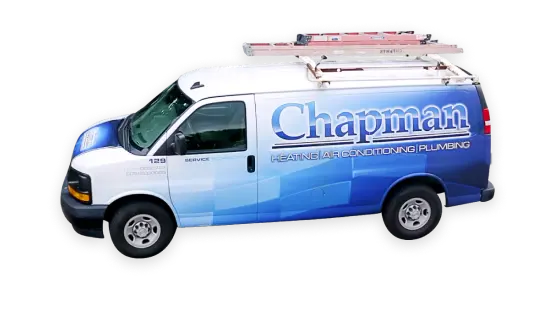
Let Chapman Diagnose Why Your Toilet Tank Isn't Filling
Is your toilet tank not filling? Some culprits are easier to fix than others. If you’re having trouble finding the exact reason, reach out to Chapman Heating, Air Conditioning, Plumbing & Electrical, Central Indiana’s most-trusted plumbing expert.
Our plumbing experts are available around the clock to handle these types of plumbing issues so you don’t have to.
Contact Chapman today, and we’ll diagnose the exact reason your tank is not filling and develop a repair solution.
Emergency Service Available
If you notice water collecting under your kitchen sink or unpleasant odors coming from it, there’s a good chance your garbage disposal is leaking. Don’t panic. With our plumbing expertise, we’re here to answer the question, “Why is my garbage disposal leaking?”
In this guide, we will list steps to remedy the issue. Understanding the signs of a leaky garbage disposal and its common causes is the first step in preventing more serious problems, such as electrical hazards, mold, and water damage.
Why is My Garbage Disposal Leaking?
A leaky garbage disposal can be caused by various factors. Let’s examine five common causes.
- Internal Damage: Internal damage to a garbage disposal is often the worst-case scenario. This type of damage is most likely tied to the garbage disposal's seals and often requires a complete system replacement instead of repairs.
- Worn or Damaged Seals: Garbage disposals have a rubber seal that connects to the flange component. When this seal is worn out or damaged, the garbage disposal can begin to leak.
- Loose Drain Lines: Tight connections are crucial for preventing leaks in numerous types of plumbing systems. Garbage disposal leaking is more likely to occur when the drain line connections are loose.
- Worn-out Gaskets: Be mindful of your garbage disposal’s gaskets. These gaskets sit around the blades and can become worn out over time, causing a leak. A worn-out gasket isn’t as complicated as other issues and can be easily replaced.
- Corrosion: Regular garbage disposal usage leads to natural wear and tear, resulting in corrosion and rust. The longer corrosion and rust are neglected, the more likely a leak can manifest. Depending on the extent of the corrosion, the entire disposal might need to be replaced.
Common Leak Locations and How to Fix Them
Where the garbage disposal leak originates depends on the type of issue. Let’s look at the most common garbage disposal leak locations and how to respond to these occasional kitchen plumbing problems.
Garbage Disposal Leaking from Bottom
A garbage disposal leaking from the bottom is usually the result of worn-out internal seals. If you notice this type of leak, you’ll most likely have to hire a professional to replace it. This is especially true when the leak is coming from the reset button.
Garbage Disposal Leaking from Top
A garbage disposal leaking from the top is likely due to a loose sink flange. This component connects your garbage disposal to your sink drain.
For this type of leak, start by tightening the mounting bolts and making sure the putty surrounding the flange isn’t jeopardized. If it is, reseal it with new putty.
Garbage Disposal Leaking from Side
When a garbage disposal is leaking from the side, it’s usually caused by a loose drain line. Two drain lines are connected to the disposal—one to the dishwasher and one to the sewer to drain waste. Each is connected by a metal clamp.
In this situation, simply try tightening the screws of the metal clamps. If that doesn’t resolve the leaking issue, replace the rubber gasket.
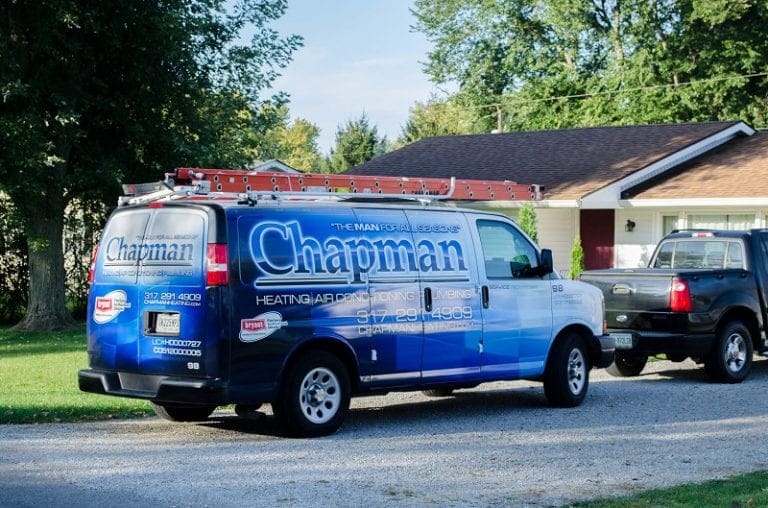
Need Help with a Leaky Garbage Disposal? We're Just a Call Away
Is your garbage disposal leaking? Turn to the plumbing professionals at Chapman Heating, Air Conditioning, Plumbing & Electrical. Our garbage disposal services are backed by experience and proven methods.
We repair, replace, and maintain plumbing issues of all kinds in Indianapolis and areas of the greater Central Indiana region like Carmel, Fishers, Avon, Plainfield, Lebanon, Broad Ripple, Camby, Westfield, Fortville, Franklin, Greenwood, and many more!
Get Help With a Leaking Disposal
At some point in a homeowner’s journey, residents will come across the common aggravation that is low water pressure. This leads to the pertinent question “Why is my water pressure low?” There is a multitude of reasons for low water pressure, and knowing those reasons and the common background behind water pressure will alleviate homeowner stress.
Symptoms of Low Water Pressure
You’ll know when water pressure in your house isn’t right. Around Circle City, Hoosiers often notice the problem first thing in the morning or when more than one faucet is running. Here are some of the most common signs:
- Faucets that only drip or trickle instead of a steady stream
- Showers that feel weak and take forever to rinse soap or shampoo
- Appliances like dishwashers and washing machines that run longer than normal
- Toilets that take too long to refill after flushing
- Water flow that drops sharply when two or more fixtures are in use
If you’ve noticed these issues in your Greater Indy area home, it’s a good idea to dig into the cause before the problem gets worse.
What Is a Normal Water Pressure Level?
A normal water pressure for your house ranges from 45 to 80 psi. Anything below that level constitutes low water pressure. If you are feeling wary that your water pressure is low, use a test gauge that measures psi. This handy tool can be found at most hardware stores. To measure your home’s water pressure, screw the gauge onto the hose spigot on the outside of the home. Turn the valve on, and your reading will appear.
7 Causes of Low Water Pressure
1. Water Demand
A common cause for low water pressure can be due to high water demand within the household. When multiple taps are used throughout the house, this can drop the water pressure below a satisfactory level. Between the multiple taps being used throughout the home, the demand becomes too high, leading to low water pressure.
This can easily be fixed by making sure the use of water throughout the house is divided properly by staggering activities that rely on water consumption. Examples would be avoiding showers when running the dishwasher and making sure multiple sinks aren’t being used at the same time.
2. Closed Shut-Off Valves
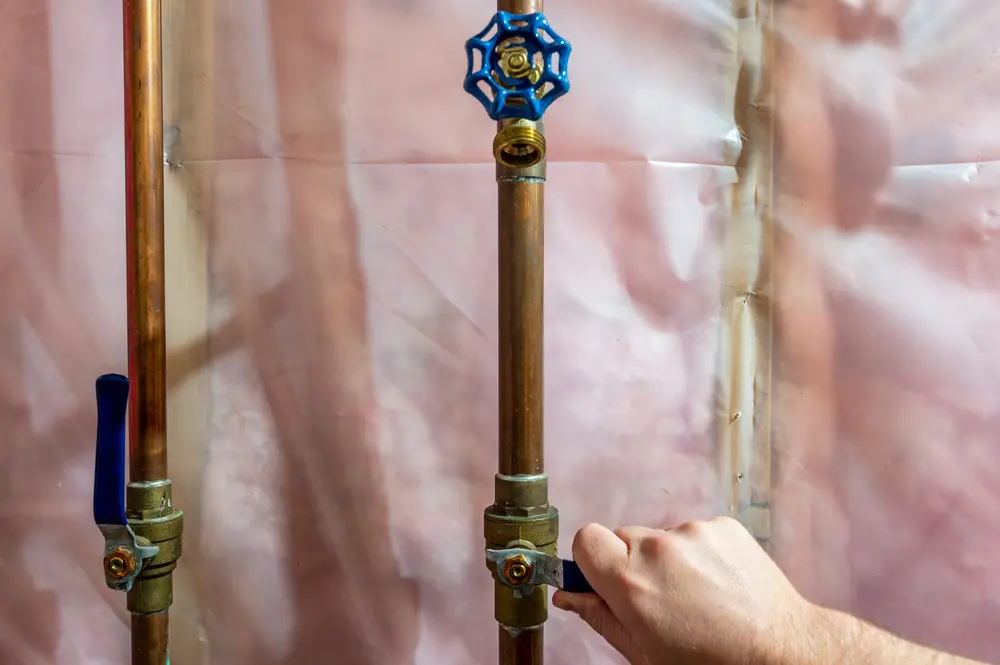
The main water shutoff valve regulates the flow of water in a home. If your water pressure is low, it may be because this valve is partially closed. For your home to receive proper water pressure, it’s essential that these valves are open.
The main shutoff valve can be located near the outside hose spigot or inside the home in the utility room. Make sure the valve is turned all the way to the opened position. Harsh winters in Indiana can lead to issues for not only your shutoff valve but also other plumbing fixtures in a home. Chapman Heating, Air Conditioning, Plumbing & Electrical can assess the situation, determine the issue, and offer a long-lasting solution.
3. Plumbing Fixture Issues
Another issue that may cause low water pressure is fixture issues. One thing to keep in mind is the aerator on a faucet fixture. The aerator is designed to reduce an influx of water flow from the faucet without compromising water pressure. Aerators can be prone to buildup by limestone, rust, or dirt. This can be fixed by removing the aerators on your faucets and inspecting them for these issues. Reinstall the aerators once they have been cleaned to determine if the water pressure is now at a good level.
Fixtures themselves can also get clogged, and given that they are relatively inexpensive, replacing them is a viable option.
4. Broken Pressure Regulator
The plumbing system within your home contains a component known as the pressure regulator. This regulator keeps water pressure at a comfortable level in your home. Your water pressure may become low or high depending on if this component is broken.
The pressure regulator is a bell-shaped component near your home’s hose connection. You can adjust the pressure regulator accordingly depending on your home’s water pressure issues, whether high or low. High water pressure in particular can cause other problems like damaged faucets, showerheads, appliances, and water lines. Call a plumber if you believe your pressure regulator needs replacing.
5. Sediment Buildup
Sediment buildup within a pipe’s walls can lead to clogged pipes over time. Minerals flowing through running water can create buildup that will ultimately induce low water pressure. A common sign of this issue is initially observing good water flow that dwindles to mere drops.
Routine checkups by your plumber will help determine the current health of your pipes to curve the chance of sediment buildup being the root cause of your water pressure problems.
6. Corrosion
Corrosion issues pertain to homeowners with metal pipes. Corrosion develops over time within metal pipes and will restrict water flow. Corroded pipes may affect a small section of pipes within a home or the whole plumbing system.
Calling a plumber will help determine whether your pipes need cleaning or if they need to be replaced. Chapman Heating, Air Conditioning, Plumbing & Electrical can offer full pipe repair or replacement in the Indianapolis area.
7. Small Branch Lines
The vertical supply stack lines that come off the plumbing system are known as branch lines. These branch lines lead to different plumbing fixtures. Low water pressure can also mean that your branch lines are too small to satisfy your home’s water demand. The fix to this issue would be best suited for your plumber to gauge if your home needs bigger branches.
Quick DIY Fixes
If low water pressure strikes your home, it can be a daunting task of what to do. Thankfully, there is a list of quick do-it-yourself fixes anyone can do before restoring to a local plumber.
Check Your Shower Heads
A simple solution to low water pressure issues can be checking your shower heads. Your shower head may have developed too much buildup. If different faucets and taps throughout your home have different water pressure levels, this is the best place to start.
Soaking your shower heads with vinegar and then cleaning them regularly afterward can help clear up depository buildup.
Drain Your Water Heater
Water heaters can also develop sediment buildup. Homeowners should regularly practice draining their water heater once a year. If this isn’t practiced, this can take years off of your water heater’s lifespan. Turn off the water heater first, then drain the tank.
Clear Debris From Pipes
Miscellaneous debris can cause your pipes to get clogged. As mentioned above, clogged pipes can cause low water pressure. A cable or snake drain that’s fed down your pipes can do a great job of unclogging your pipes. Doing this task regularly is a healthy way to help the timespan and efficiency of your home’s pipes.

Fix Low Water Pressure with the Expert Plumbers at Chapman
If these DIY tasks haven’t fixed your water pressure issues, it’s probably time to contact a local professional. Low water pressure can be caused by a degree of issues. Indianapolis area residents can have faith in the certified professionals at Chapman Heating, Air Conditioning, Plumbing & Electrical for their plumbing needs that range from routine inspections, pipe replacements, cleaning, repair, and more to fix low water pressure in your home. Schedule an appointment with Chapman Heating, Air Conditioning, Plumbing & Electrical today.
A foul odor coming from your sink drain is an unpleasant and perplexing problem. The unpleasant scent may linger in your kitchen or bathroom, making everyday tasks uncomfortable and leaving you wondering, “Why does my sink drain smell?”
From food particles and grease buildup to bacterial growth and plumbing issues, there are various reasons why your sink drain might emit a foul smell. Let’s take a few minutes to delve into the common culprits behind this problem and explore possible solutions to eliminate the odor and restore freshness.
5 Reasons for a Smelly Sink Drain
Mold and Mildew
The damp, dark environment of sink drains provides the perfect breeding ground for mold and mildew. These fungi thrive in moist conditions and can produce a musty odor. Regular cleaning and proper ventilation help prevent mold and mildew growth, eliminating the source of the unpleasant smell.
Clogged Sewer Line
A clogged sewer line can cause sewage backups, leading to foul odors that travel out of your sink drain. This issue often requires professional intervention to diagnose and resolve, as it may indicate a more significant problem within your plumbing system. Prompt attention to clogged sewer lines can prevent further damage and eliminate unpleasant odors.
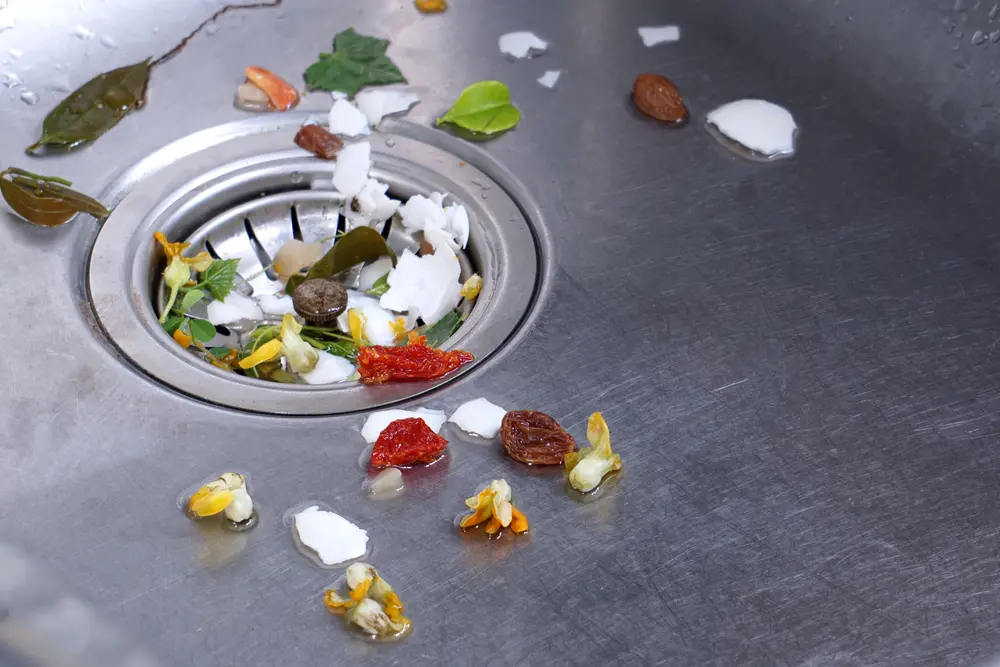
Rotting Food
Food particles that accumulate in sink drains can decompose over time, resulting in a foul smell. Rotting food debris can also attract bacteria and other microorganisms, which only exacerbates the odor problem. Regularly clearing food scraps from your sink and using drain covers can help prevent this issue and keep your sink smelling fresh.
Venting Issues
Proper venting is essential for maintaining optimal airflow in your plumbing system and preventing foul odors from entering your home. Venting issues, such as blocked or improperly installed vents, can lead to sewer gas buildup in sink drains, resulting in unpleasant smells. Professional inspection and repairs of venting problems are necessary to ensure proper ventilation and eliminate odors.
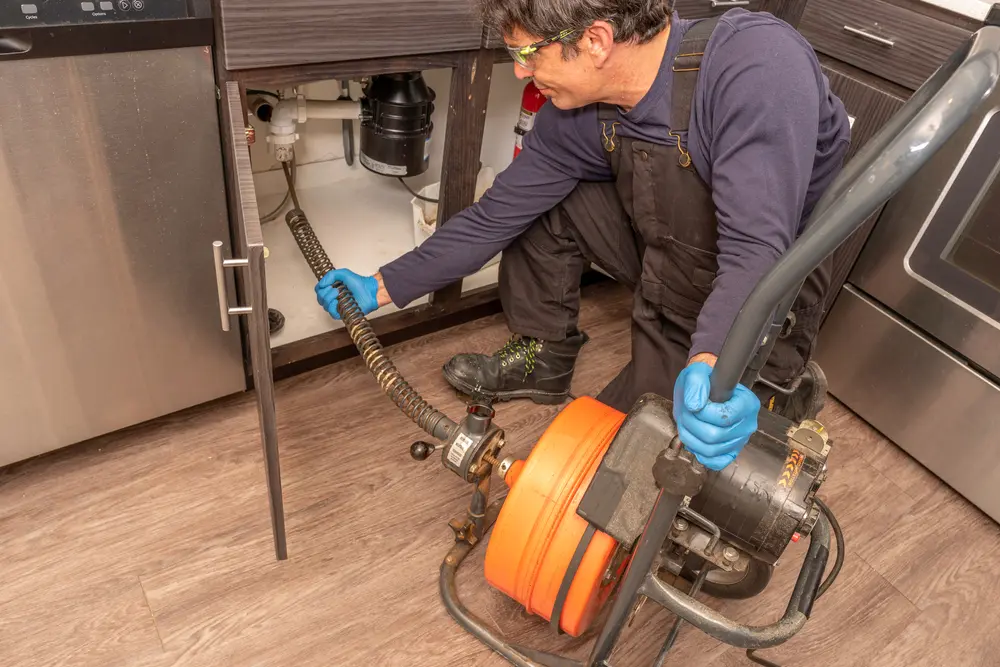
Clogged Drain
A clogged drain can trap debris and organic matter, leading to bacterial growth and foul odors. Hair, soap scum, and other materials can accumulate in sink drains over time, causing blockages and odor problems. Regular drain cleaning and garbage disposal maintenance can help prevent clogs and keep your sink smelling fresh and clean.
Dry P-Trap
The P-trap, a curved section of pipe beneath the sink, traps water and prevents sewer gases from entering your home. If the P-trap becomes dry or loses its seal, sewer odors can permeate your sink drain. Running water regularly and ensuring proper P-trap maintenance can help maintain the seal and prevent unpleasant odors from escaping.
Tips to Get Rid of a Smelly Drain
To get rid of a smelly drain, try following these tips:
- Boiling Water: Pouring boiling water down the drain can help dissolve and flush away grease, food particles, and other debris that cause unpleasant odors.
- Baking Soda and Vinegar: Create a natural cleaning solution by mixing baking soda and vinegar. Pour the mixture down the drain, let it fizz for a few minutes, then flush with hot water so it can work its magic. This combination helps break down buildup and neutralize odors.
- Citrus Rinds: Toss citrus fruit rinds, such as lemon or orange peels, into the garbage disposal and run cold water. The citrus oils will help freshen the drain, leaving a much more pleasant scent behind.
- Ice Cubes and Salt: Drop a few ice cubes down the drain followed by a handful of coarse salt. Turn on the garbage disposal, and let it grind the ice and salt mixture. The abrasive salt dislodges buildup and debris while the ice helps clean the blades.
By incorporating these simple yet effective methods into your cleaning routine, you can banish foul odors from your drain and enjoy a fresh-smelling sink once again.
Get Your Home Smelling Fresh Again With Chapman
Eliminating an unpleasant drain smell from your home is essential for creating a clean and inviting environment for family and friends. With Chapman's range of effective odor-elimination products and solutions, you can enjoy a fresh-smelling home every day.
Whether you're addressing a bad smell coming from your sinks or tackling plumbing issues, drain cleaning, or sewer cleaning, Chapman has you covered with reliable odor-fighting solutions. Say goodbye to unpleasant odors and hello to a revitalized home with Chapman. Schedule a service today to get one step closer to a fresher space.
If you've ever experienced your dishwasher backing up into your sink, you know how frustrating and messy it is. This common household issue can stem from something as simple as a clog to more serious plumbing issues.
Let’s take a look at common reasons why your dishwasher might be backing up into your sink along with practical steps to address the problem. Whether it's a minor blockage or a more complex plumbing issue, understanding the causes and knowing what to do next can help you resolve the issue swiftly.
Why Your Dishwasher Might Be Backing up Into Your Sink
Several factors may contribute to this problem, ranging from minor clogs to more serious plumbing issues. Understanding the underlying causes of this issue can help you tackle the issue effectively. Here's a brief overview of possible reasons why your dishwasher is backing up into your sink.
Clogged Sink
Experiencing a clogged sink is not only an inconvenience but can also lead to your dishwasher backing up into the sink. Several factors contribute to sink blockages, ranging from food debris and grease buildup to plumbing issues.
A clogged sink impedes proper drainage, causing water from the dishwasher to back up into the sink.
Obstructed Dishwasher Drain
Is your dishwasher overflowing with water and causing a leak? It could be due to an obstructed drain that causes water to back up into your sink. Culprits like food scraps, grease, or even forgotten utensils can form a blockage in your dishwasher drain.
When the dishwasher drain gets clogged, water backs up into the sink, turning your kitchen into a wet mess.

Jammed Garbage Disposal
If your garbage disposal is jammed or malfunctioning, it can disrupt the drainage flow, leading to water backing up into the sink. Dishwashers often share drainage connections with garbage disposals, making them more susceptible to the consequences of disposal issues.
A backed-up sink is just the tip of the iceberg; a jammed disposal can exacerbate the situation, causing water to overflow into the sink and beyond.
Blocked Air Gap
The issue might be a blocked air gap. A blocked or improperly installed air gap can disrupt drainage flow, leading to water backing up into the sink. Dishwashers rely on air gaps to prevent backflow, making them vulnerable to issues when the air gap is blocked.
When the air gap is blocked, water from the dishwasher seeks refuge in the sink, turning your kitchen into a splash zone.
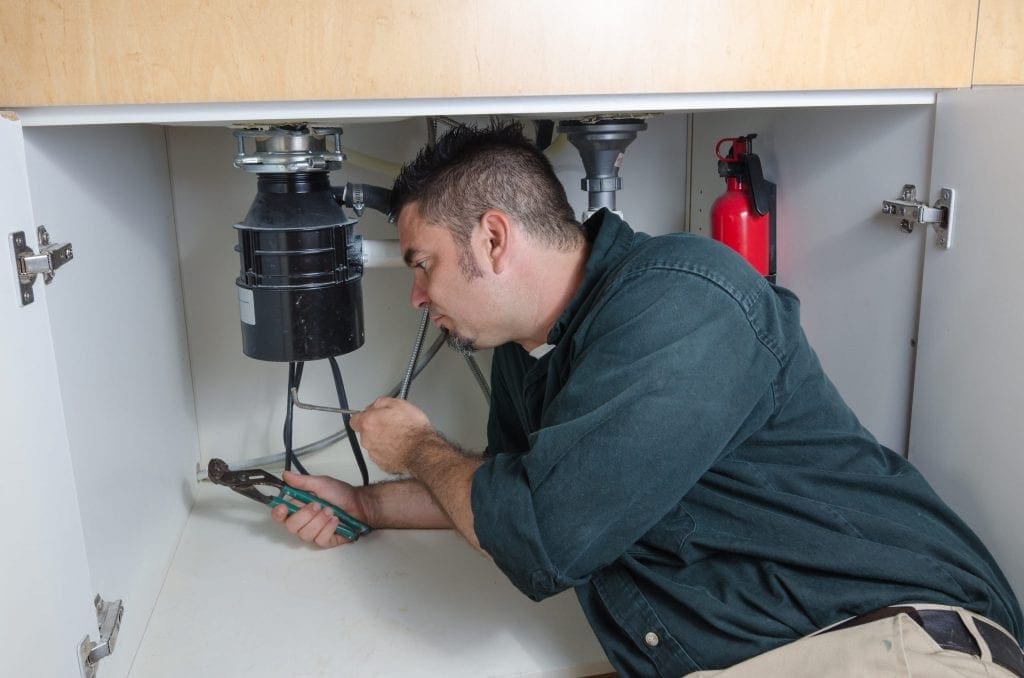
Expert Solutions for Clogged Sinks and Dishwasher Backups with Chapman
Looking for reliable plumbing solutions in Indianapolis or a surrounding area? Look no further than Chapman Plumbing. With a team of experienced professionals, Chapman offers a range of expert plumbing services to address all your needs.
Whether it's fixing a clogged sink, resolving dishwasher backups, or tackling more complex plumbing issues, Chapman has you covered. Our plumbers are dedicated to providing top-notch service and ensuring customer satisfaction every step of the way. Schedule an appointment with Chapman today!
Fix Your Clogged Sink or Dishwasher Backup Today!
If you've lived in Indiana for any length of time, you know the month of April is full of pop-up rain showers and thunderstorms. All of that rain tends to lead to flooding and, if your basement is prone to flooding, you'll want to take precautions in order to keep your home and possessions safe and dry.
Why Does My Basement Flood?
Many families in Indianapolis and beyond find themselves facing the same problem every time it rains , a flooded basement. This can lead to a variety of issues, including mold growth, damage to your belongings, and structural damage to the building. But why is it happening?
If your home has a sump pump, you shouldn't find that your basement is flooding consistently. A sump pump's job is to effectively pump water away from the home's foundation. A failing sump pump, though, won't be able to pump water away from the home, allowing water to pool into your basement.
However, the cause of consistent flooding can go beyond sump pump issues. Water pooling, sewer backup, and water damage to the foundation of the home can all be at fault. To have your basement inspected and to determine what the cause of your spring basement flooding is, get in touch with a professional.
Emergency Power Source
Spring basement flooding will often cause electrical outages. It's important to be prepared by installing an emergency power source. Install a generator to provide emergency electrical service for your furnace, refrigerator, and septic tank pump in case power is lost.
If you do not have a generator installed, you could find yourself running into flooding, frozen pipes, or a flooded septic tank. These issues can cause even bigger and more expensive problems down the road.
Install a Sump Pump
A sump pump is vital to keeping your basement dry and pumping water away from your home. This device pumps groundwater from heavy rain out of the pump pit in your basement. If you don't already have a sump pump, you will need to have one installed.
If you already have a sump pump, but you still find that your basement is flooding, get in contact with a plumbing professional. They can inspect your sump pump to determine if it is still working and, if it's not, they'll be able to replace it.
Install a Backup Sump Pump
Even the most reliable piece of equipment can malfunction and fail. That's why it is important to invest in a backup sump pump system. A backup sump pump, even a battery-operated model, can begin working if the main sump pump is out of commission. This will greatly reduce your chances of basement flooding. Some systems even come with additional security features like an alarm that will alert you if the battery-operated sump pump has started to work.
Preparation is key to protecting your home and everything in it. By properly preparing for heavy rain with the installation of a backup sump pump, you'll ensure that your home stays safe and dry.
Contact Chapman for Sump Pump Installation
Spring storms can really take a toll on your basement. Flooding costs homeowners thousands of dollars on average each year. Get in contact with Chapman today to discuss your options and to determine how you can protect your home from the damage caused by flooding.
If you deal with basement flooding year after year, it's time to do something about it. Call us at (317) 207-9378 for more information about sump pumps, or schedule an appointment with us today.
Garbage disposals are an essential kitchen appliance. They help us clean plates and bakeware without making trips back and forth to the trash can. But like all appliances, garbage disposals can break down or stop working suddenly. When that happens, who do you call to fix your garbage disposal when it’s not working?
These appliances are unique because garbage disposals require a mix of electrical and plumbing knowledge, which might make you question who to call to fix your issue. However, knowing who to call can save you time and money and get your kitchen operating again in no time.
Chapman Heating, Air Conditioning, and Plumbing specializes in plumbing services with a solid background knowledge of electrical systems. Our team of Indianapolis plumbers have the expertise and know-how to install or replace fixtures, conduct routine maintenance, or fix any plumbing problem, including top-notch garbage disposal repair.
Why You Should Call a Plumber for Your Garbage Disposal Problem
Even though garbage disposals are powered by electricity, plumbers will be the most effective when it comes to resolving your garbage disposal issue. Most likely, a plumber installed your garbage disposal, and they have the knowledge to solve the majority of garbage disposal problems, even electrical ones.
In the event that your garbage disposal is clogged or jammed, an electrician might not know the most effective way to clear the clog or locate and eliminate the source of the problem. Even if you’re sure you have an electrical issue with your garbage disposal unit, call a plumber first. They have more experience with garbage disposals and can provide fast, effective solutions.
Signs You Should Call a Plumber About Your Garbage Disposal Problem
The type of garbage disposal issue you’re experiencing may determine if you need to call a plumber at all. Some garbage disposal problems can be fixed by properly resetting the disposal or removing a clog. However, some issues require the knowledge of an experienced professional.
Your garbage disposal is responsible for processing different kinds of food waste, and as a result, it can wear down and break over time. Here are some of the most common warning signs that it’s time to call in a plumber:
- Age: Like all home appliances, garbage disposals have a limited lifespan, but many are unsure when to replace their garbage disposal. They typically need to be replaced every eight to 15 years, depending on the brand and model.
- Ineffective Grinding: If you suspect that there is a garbage disposal issue that needs to be addressed, run the unit and water for approximately 30 seconds. Then, reach into the disposal to check if there are waste items that have not been removed. If so, that might mean your blades have gone dull and need to be replaced.
- Leaking Under the Sink: Especially as your unit ages, you’ll want to routinely check for leaks under your sink, including any active dripping or puddles. Typically, disposals leak only while the water is on or while the unit is running. A leak usually indicates a hose or seal problem, which requires a plumber to remove the unit.
- Persistent Odors: Food waste is primarily what goes down your disposal. If it is not functioning properly, you might notice an unpleasant odor coming from the drain and/or garbage disposal. We recommend cleaning the sink and unit with natural cleaners and odor removers such as baking soda. If the odor persists, have the unit inspected by a professional.
- Unresponsive: If you flip the power switch and nothing happens, that means you may have an electrical issue rather than a plumbing problem. However, it’s still best to have your unit assessed by a plumber who has the knowledge to reconnect the system and restart your unit. Do not attempt to work on an electrical problem in your garbage disposal on your own.
Garbage Disposal DIY Fixes
Here are some common garbage disposal problems and how to troubleshoot them yourself:
- Garbage Disposal Won’t Turn On: First, make sure your garbage disposal is plugged in. Next, try hitting the reset button on the bottom of the disposal. If the disposal has been tripped, this button will pop out. Popping it back in should help. If neither is the case, check your circuit breaker to see if that has been tripped, or try resetting the circuit.
- Disposal Is Humming But Does Not Grind: This most likely means your disposal is jammed. Make sure the garbage disposal is off, and then get a flashlight to see if there is something blocking the blades of the disposal. Use a spoon or a long instrument to see if you can clear the blockage. Never stick your fingers down a garbage disposal.
- Garbage Disposal Drains Slowly: If water is backing up or draining too slowly, this most likely means that your garbage disposal is clogged. Try to remove what waste you can from the disposal. You can also disconnect the drain trap to better remove the clogged items.
- Garbage Disposal Is Leaking: There are several connections to your garbage disposal that can leak. Find the source of the leak, and get a wrench to tighten bolts.
If you’ve tried to fix it yourself and are still having issues, it’s time to give a professional Indianapolis plumber a call.
How to Avoid Garbage Disposal Issues
In order to keep your garbage disposal in working order, there are a few rules you should live by when operating your garbage disposal:
- Always run cold water when operating your garbage disposal.
- Never use chemical drain cleaners to unclog your garbage disposal. Not only are they not effective, but they also add toxic liquids to your kitchen sink and pipes.
- Grind up lemon peels and ice cubes to keep your garbage disposal from developing odors.
- Do not grind fibrous foods like coffee grounds, eggshells, potato peels, bones, or onion skins.
Whether it’s repairing your garbage disposal or having a new one installed, Chapman can help. Schedule your garbage disposal service in Indianapolis and the surrounding area with the experts at Chapman today.







